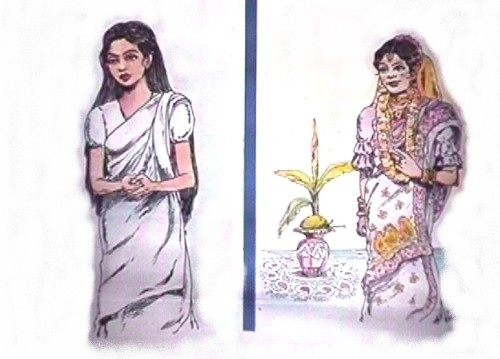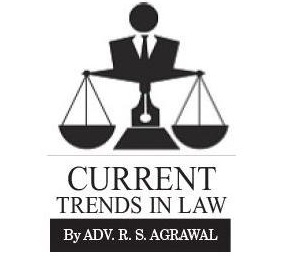Effect Of Widow’s Remarriage
Date :05-Jul-2021

By Adv. R. S. Agrawal :
According to the HC as per section 6 of the Hindu Widows Remarriage Act, 1856, in case of remarriage, all the formalities for marriage are to be proved. Section 6 contemplates performance of almost the same ceremonies, which are required in the case of marriage of Hindu female. In order to prove the remarriage, performance of all the ceremonies have to be gone through in her remarriage.

THROUGH the judgment in the case - Sribachahh Kumar Bhoi & Others v.Sindhu Akhil Kolta & Others, delivered on June 28, 2021, Justice Sanjay K. Agrawal, at the Chhattisgarh High Court in Bilaspur, has held that the effect of remarriage would be , widow loses her right in the property inherited from her husband and unless the fact of remarriage is strictly proved after observing the ceremonies required as per section 6 of the Hindu Widows’ remarriage Act,1856, the fact of remarriage cannot be said to be established by which right to property, which is a constitutional right , is lost that too by widow.
After appreciating oral and documentary evidence available on record the trial court had partly decreed the suit holding that clause 29 of the Raigarh State Wajib-ul-arz applies to this case and as the defendant widow Kiya Bai (since dead) had already entered into second marriage in 1954-55 and as such she would have been entitled for 5 khandi of land for maintenance. In the appeal filed by the defendant -2, daughter of the widow, Sindhu questioning the judgment and decree of the trial court, the first appellate court allowed her appeal and held that in the light of the section 14(1) of the Hindu Succession Act, 1956, her widowed mother Kiyabai had become full owner of the said property on coming into force of the 1956 Act and therefore, the plaintiff Loknath (since dead) and his Legal Representatives are not entitled for any decree and set aside the judgment and decree passed by the trial court. Aggrieved thereby, the HC was moved through this second appeal. In the light of the Supreme Court judgments of the cases –Gummalapura Taggina Matada Kotturuswami v. Setra Veeravva and others-(1970) 1 SCC 786, Gostha Behari v. Haridas Samanta – AIR 1957 Cal 557; Deendayal and another v. Rajaram – AIR 1970 SC 1019; V.Tulasamma and others v. Sesha Reddy (Dead) by LRs-(1977) 3 SCC 99; Sadhu Singh v. Gurdwara Sahib Narike & Others – AIR 2006 SC 3282, the HC has pointed out that the widow’s husband Ghasi Ram died in the year 1942 and she became the limited owner of his share by virtue of the provisions contained in section 3(2)of the Hindu Women’s Right to Property Act, 1937 and after coming into force of the Act of 1956 and by operation of its section14(1) with effect from June 17, 1956, her limited right in the suit –property would blossom into absolute estate as contemplated by section 14(1).and she was to become absolute owner of the said property as on date.
The HC has held that since in this case, the widow had already became limited owner before coming into force of the Act of 1956 and thereafter, has limited right ripened into absolute right , clause 29 of the Raigarh State Wajib-ul-arz would not be applicable , as such, the arguments based on this point are rejected. Now one more objection is that since the widow had already entered into marriage with someone else in 1954-55 after marriage of her daughter, therefore, she had lost her right over the property deserves to be noticed. In para 5 of the plaint it has been simply stated that the Widow remained in village Chichor Umariya till 1954-55, but after marriage of her daughter, she left the village after marrying someone else in chudi form, which the defendants have specifically denied. According to the HC as per section 6 of the Hindu Widows Remarriage Act, 1856, in case of remarriage, all the formalities for marriage are to be proved. Section 6 contemplates performance of almost the same ceremonies, which are required in the case of marriage of Hindu female. In order to prove the remarriage, performance of all the ceremonies have to be gone through in her remarriage. There can be no valid marriage in any form without substantial performance of the requisite religious ceremonies.
The said performance is necessary for the completion of the marriage. The effect of valid remarriage is that the widow loses her right in the property inherited from her previous husband. Therefore, where remarriage is set up as defence, it has to be strictly proved looking to devastating consequence to be befallen upon widow in the shape of depriving her of right to property. The HC has pointed out that as such, there is no adequate pleading with regard to remarriage of Kiya Bai with any person and therefore, there is neither pleading of remarriage of Kiyabai with someone nor there is admissible evidence on record to hold that Kiya Bai had remarried and lost her right to the property, as it has been already held that the effect of remarriage would result in the widow losing her right in the property inherited from her husband and unless the fact of remarriage is strictly proved after observing the ceremonies required as per section 6 of the Act of 1856,the fact of remarriage cannot be said to be established by which the right to property , which is a constitutional right, lost that too by widow.
Therefore, the finding recorded by the first appellate court that the suit property fell in the share of Ghasi Ram and after his death, his widow remained in physical possession of the suit land and by virtue of section 3(2) of the Hindu Women’s Rights to Property Act, 1937, the widow became the limited owner of the property during her lifetime till coming into force of the Hindu Succession Act, 1956, she became absolute owner of the suit property, is correct finding of fact based on the evidence available on record. It is neither perverse nor contrary to the facts on record. The HC did not find any perversity or illegality in the said finding recorded by the first appellate Court. The 3 substantial questions of law formulated by the Court have been answered accordingly. The HC has dismissed the second appeal and stated in conclusion that the first appellate Court is absolutely justified in granting the appeal and dismissing the suit filed against the defendants and as such, the second appeal deserves to be and is accordingly dismissed.